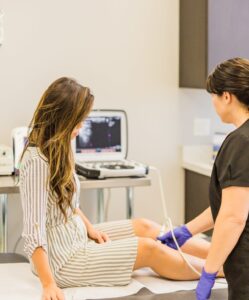Bloodclots pose a serious threat to your health. When we treat patients with DVT, a condition in which blood clots form in the deep veins of your legs, we face a medical emergency. That’s because, if a blood clot breaks free and travels to other parts of your body—especially to your lungs—it can threaten your life.
But many people want to know: why do I get blood clots? And, what are they exactly? Is there anything I can do to prevent them? So, in this post, we will try to answer all of those questions. Just keep reading to learn more.

When things are working properly, your blood flows freely through your body, delivering oxygen to your organs and flushing out the waste products created by your body’s metabolic processes. But, if you get a cut, scrape or injury, blood in your arteries and veins will clot, blocking your blood vessels and preventing you from bleeding out.
But, when your arteries or veins get blocked when you aren’t injured, you need medical intervention. Otherwise, you can face complications such as strokes, heart attacks, organ damage and even limb loss. On certain occasions, as we mentioned earlier, blood clots can kill you by traveling to your lungs, interfering with your ability to breathe.
Blood clots form in blood vessels—either your deep veins or your arteries. Typically, they form after your blood vessels get damaged, triggering a reaction in your body. This reaction involves a mix of platelets and clotting factor proteins.
Anyone can develop a clot. But certain issues raise your risk including pregnancy, heart disease and cancer. Studies have also revealed that people with atopic dermatitis (also known as eczema) have a higher incidence of venous clots. And a more recent study revealed that long-term exposure to air pollution also increases your clotting risk.
Lifestyle could also be an issue. Being stuck in bed for extended periods makes bloodclots more likely to form. Any damage to your blood vessel walls, either due to injury or surgery, could also spell trouble. Finally, while research is ongoing, prior COVID infection seems to trigger an inflammatory response that could make your blood more likely to clot.
Since a blood clot in your legs can break free and travel to your lungs, it's very important to recognize the early warning signs. With a clot, you may notice a hard lump in your leg, and you may also notice inflammation.
When your surface veins are impacted, some people describe clots as feeling like thin sausages. And, in many cases, the skin on top of the clot will appear red in color. If you notice any of these signs, seek immediate medical attention. Otherwise, you're at risk for serious complications.
As we mentioned, problematic blood clots form when the connection between platelets and clotting factor proteins goes awry. Platelets are objects in your blood that group together and stick to the walls of your blood vessels when needed.
Clotting factors are proteins in the blood that trigger a reaction that makes platelets and red blood cells stick together. Typically, other proteins in your body make that reaction stop, so your clot only reaches the size needed to prevent excess bleeding. But when damage to your blood vessels impacts that reaction, clots may grow unchecked, leaving you at risk for clotting conditions like DVT.
We can’t always predict who will be affected by blood clots, or when those clots will form. But we do know certain factors that can increase your risk for clots:
According to our vascular specialists in Houston and Dallas, the best way to treat blood clots is to prevent their formation. Some evidence suggests that drinking one glass of wine or red grape juice daily could help prevent bloodclots. Why is that the case? Well, red grapes contain an antioxidant called polyphenol that prevents the platelets in your blood from sticking together to form a clot.
But grabbing a glass of vino can't be the only preventative measures that you take. Maintaining a healthy lifestyle, staying mobile even on long trips, and using compression therapy can all help protect you from DVT. Even if you develop a DVT, compression therapy—especially within 24 hours of the clot’s formation—can help manage your risk of further complications.
So, as with many other vein and arterial conditions, timeliness is key when it comes to treating blood clots. The sooner you see a vascular specialist, the better the outcome you will likely enjoy. So if you have any symptoms of or risks for blood clots, schedule an appointment with our specialists today!